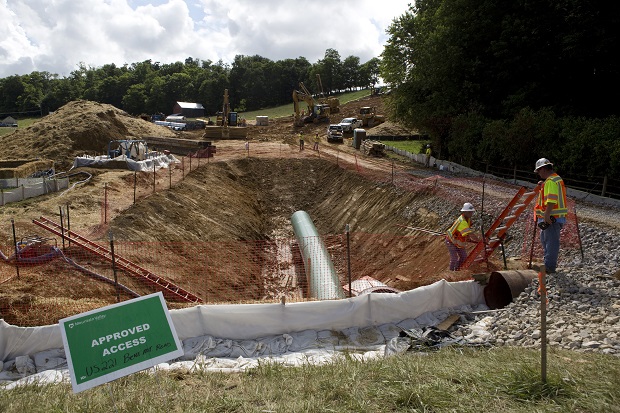New clarification bill targets roadbuilders and utilities
By: Ethan Duran//May 8, 2023//

By Ethan Duran
Wisconsin State Sen. Cory Tomczyk (R – Mosinee) in late April introduced a bill to create a process for the Wisconsin Department of Transportation to award compensation for delays when a transportation contractors’ progress is halted when they run into utility lines during state road projects.
The bill will simplify the process when a transportation contractor runs into a utility in the right-of-way – whether it be electric, gas, water, sewer or telecommunication services – causing delays and lost time, according to a letter by Tomczyk, Rep. Dave Steffen (R – Green Bay) and James Edming (R – Glen Flora) to the Legislature on April 24.
Under current law, the contractor must collect compensation from the utility involved when a highway or other transportation project is delayed because utilities were reported inaccurately or not reported at all, according to the letter. Contractors and utilities would have to go to court over who was responsible for the delay and who has to pay for it.
Under the new bill, the Wisconsin Department of Transportation will directly compensate the contractor if they are eligible, the letter added. The bill would create an appeal process to resolve disputes transparently and efficiently if WisDOT seeks compensation from another party for the delay, the letter added.
Because of past squabbles, contractors typically build potential risk costs into their project bids which puts pressure on taxpayers, the letter added.
Dan Zignego, President of Waukesha-based Zignego Company, told the Wisconsin Law Journal roadbuilders and utilities have interacted more and more as telecommunications and suburban infrastructure grows. Zignego Company is a member of the Wisconsin Transportation Builders Association and is contracted by WisDOT.
“We do interact with utilities more and more. The reality is more stuff is going underground and above ground in public rights-of-way because of internet and phone lines are being added. As our suburbs become more urbanized, the amount of infrastructure on the utility side is growing significantly. This issue has been escalating over the years because when it was one gas main on one project, it was a big deal on that project. But now it’s every state highway anywhere near an urban center,” Zignego said.
Companies that work in earthwork and installations subcontracted with Zignego Company have run into existing utilities in major intersections like Highway 100 and Brown Deer Road in Milwaukee County, Zignego added. When the subcontractor encounters a utility, they must collect payment for lost time from utilities such as We Energies and AT&T for example, he noted.
“Putting the contractor in the bill collecting business with a giant utility company that we don’t have any contractual relationship with, it’s not a good fit for us. It forces us to add assumed cost in our bids for projects,” Zignego said.
In a joint letter to the Wisconsin Legislature, the WEC Energy Group, Wisconsin Manufacturers & Commerce and the Wisconsin Transportation Builders Association urged support for the bill.
“The safe and timely completion of Wisconsin’s highway construction projects is important to the men and women who work in the transportation industry, those who own the underground utility infrastructure within work zones, the traveling public, and the Wisconsin taxpayers who are ultimately footing the bill. We therefore request your support for LRB 1867/1, which seeks to make process reforms at WisDOT that will benefit contractors, utilities, and the cost-effectiveness of our highway projects,” according to the letter.
WisDOT is analyzing the proposed bill and any potential impact, an agency spokesperson told the Wisconsin Law Journal.
We Energies says they support the bill because it will clarify and streamline the process when utility location issues happen during large state road projects, a spokesperson for the energy company added.
The bill will go through a public hearing in both houses of the Legislature later in May, and then will receive a committee vote before going to the floor of each house, Tomczyk told the Wisconsin Law Journal.
“While the legislative process is just getting underway, I’m confident my colleagues will see this bill as a win-win; both for the taxpayers who pay for public projects as well as the businesses who work on them,” Tomczyk added.
When the committee meets, authors of the bill will testify alongside interested trade groups and industry partners who have an interest in the change.
Legal News
- Former law enforcement praise state’s response brief in Steven Avery case
- Eric Toney announces re-election bid for Fond du Lac County District Attorney
- Former Wisconsin Democratic Rep. Peter Barca announces new bid for Congress
- Republicans file lawsuit challenging Evers’s partial vetoes to literacy bill
- More human remains believed those of missing woman wash up on Milwaukee Co. beach
- Vice President Harris returning to Wisconsin for third visit this year
- Wisconsin joins Feds, dozens of states to hold airlines accountable for bad behavior
- Trump ahead of Biden in new Marquette poll
- Bankruptcy court approves Milwaukee Marriott Downtown ‘business as usual’ motion
- New Crime Gun Intelligence Center to launch in Chicago
- Arrest warrant proposed for Minocqua Brewing owner who filed Lawsuit against Town of Minocqua
- Wisconsin Supreme Court justices question how much power Legislature should have
WLJ People
- Power 30 Personal Injury Attorneys – Russell Nicolet
- Power 30 Personal Injury Attorneys – Benjamin Nicolet
- Power 30 Personal Injury Attorneys – Dustin T. Woehl
- Power 30 Personal Injury Attorneys – Katherine Metzger
- Power 30 Personal Injury Attorneys – Joseph Ryan
- Power 30 Personal Injury Attorneys – James M. Ryan
- Power 30 Personal Injury Attorneys – Dana Wachs
- Power 30 Personal Injury Attorneys – Mark L. Thomsen
- Power 30 Personal Injury Attorneys – Matthew Lein
- Power 30 Personal Injury Attorneys – Jeffrey A. Pitman
- Power 30 Personal Injury Attorneys – William Pemberton
- Power 30 Personal Injury Attorneys – Howard S. Sicula











